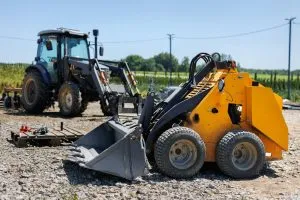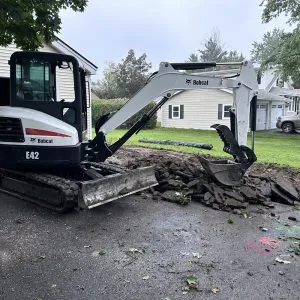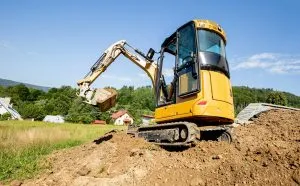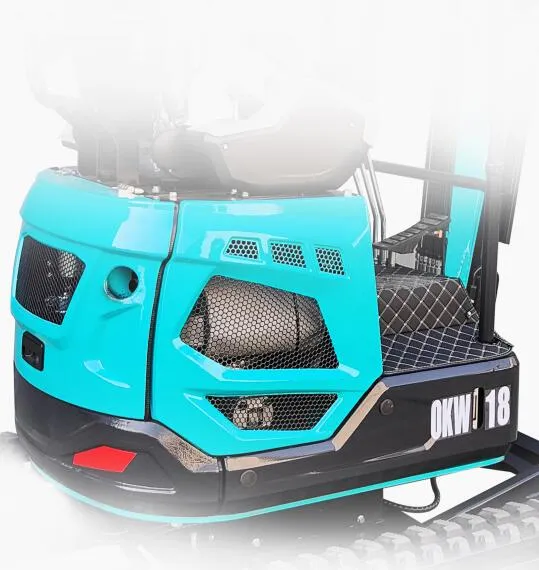Introduction
Landscaping projects, whether residential or commercial, demand precision, efficiency, and versatility. Mini excavators, with their compact size and powerful capabilities, have become indispensable tools in modern landscaping. These machines offer the perfect balance of maneuverability and strength, making them ideal for various tasks, from digging trenches to leveling ground. This article explores the extensive uses of mini excavators in landscaping, highlighting their advantages and applications to help you make the most of these versatile machines.

What is a Mini Excavator?
Definition and Overview
Mini excavators, also known as compact excavators, are smaller versions of standard excavators. They typically weigh between 1 to 10 tons and are designed for tasks that require more precision and maneuverability than their larger counterparts. Equipped with a boom, dipper, and bucket, mini excavators can perform a range of functions, including digging, grading, and lifting.
Key Features
- Compact Size: Allows access to tight spaces and minimizes damage to surrounding areas.
- Versatility: Interchangeable attachments such as buckets, augers, and breakers.
- Ease of Use: User-friendly controls and improved visibility for operators.
- Fuel Efficiency: Consumes less fuel than larger machines, reducing operating costs.
Advantages of Using Mini Excavators for Landscaping
Maneuverability and Accessibility
One of the primary advantages of mini excavators is their ability to navigate confined spaces. This feature is particularly beneficial in residential landscaping where space is limited. Mini excavators can easily maneuver around buildings, fences, and other obstacles without causing significant disruption to the site.
Precision and Control
Mini excavators offer exceptional precision, allowing operators to perform delicate tasks with ease. Whether it’s digging a narrow trench for irrigation or planting trees, these machines provide the control needed to execute tasks accurately, ensuring minimal impact on the surrounding landscape.
Cost-Effectiveness
Compared to larger excavators, mini excavators are more cost-effective to purchase, operate, and maintain. Their fuel efficiency and lower operational costs make them an economical choice for landscaping projects, especially for small to medium-sized tasks.
Versatility with Attachments
The ability to switch between various attachments makes mini excavators incredibly versatile. From augers for drilling holes to hydraulic hammers for breaking up concrete, the range of attachments available enables these machines to handle multiple landscaping tasks efficiently.
Key Landscaping Applications of Mini Excavators
Site Preparation and Clearing
Clearing Vegetation
Mini excavators are excellent for clearing vegetation, including bushes, small trees, and stumps. Their compact size allows them to work in areas where larger machinery cannot, making site preparation quicker and more efficient.

Grading and Leveling
Achieving a level surface is crucial for many landscaping projects. Mini excavators can grade and level land with precision, ensuring a smooth and even foundation for subsequent landscaping activities such as laying sod or building patios.
Digging and Trenching
Irrigation and Drainage Systems
Installing irrigation and drainage systems requires precise trenching. Mini excavators can dig narrow and deep trenches necessary for laying pipes, ensuring proper water management in the landscape.
Planting Trees and Shrubs
When planting trees and shrubs, it’s essential to dig holes of appropriate depth and width. Mini excavators can perform this task efficiently, ensuring the new plants have the best start for growth.
Hardscaping Projects
Building Retaining Walls
Retaining walls are essential for managing soil erosion and creating level areas in sloped landscapes. Mini excavators can excavate the necessary foundation and move heavy materials like stones and blocks into place.
Constructing Patios and Walkways
For constructing patios and walkways, mini excavators can remove existing materials, dig out the foundation, and transport new materials like gravel and pavers, streamlining the construction process.
Landscaping Maintenance
Mulching and Composting
Mini excavators can be used to spread mulch and compost across large areas, enhancing soil health and plant growth. This application is particularly beneficial in maintaining gardens and parklands.
Snow Removal
In colder climates, mini excavators equipped with snow blades or blowers can efficiently clear snow from driveways, pathways, and other landscaped areas, ensuring accessibility during winter months.
Choosing the Right Mini Excavator for Landscaping
Assessing Project Requirements
Before selecting a mini excavator, it’s crucial to assess the specific requirements of your landscaping project. Consider factors such as the size of the area, the type of soil, and the tasks to be performed.
Understanding Machine Specifications
Different mini excavator models come with varying specifications. Key factors to consider include the machine’s weight, digging depth, reach, and attachment compatibility. Choose a model that best suits the scope and nature of your landscaping work.
Evaluating Attachments and Accessories
The versatility of mini excavators lies in their attachments. Ensure the machine you choose is compatible with the necessary attachments for your project. Popular attachments for landscaping include buckets, augers, thumbs, and trenchers.

Considering Operator Comfort and Safety
Operator comfort and safety are paramount in any landscaping project. Look for mini excavators with ergonomic controls, comfortable seating, and advanced safety features like ROPS (Rollover Protective Structure) and FOPS (Falling Object Protective Structure).
Safety Considerations When Using Mini Excavators
Training and Certification
Proper training and certification are essential for safe operation. Operators should be well-versed in the machine’s controls and safety protocols to prevent accidents and ensure efficient performance.
Site Inspection and Preparation
Conduct a thorough site inspection before starting any work. Identify potential hazards, such as underground utilities and unstable ground, and take necessary precautions to mitigate risks.
Personal Protective Equipment (PPE)
Operators should wear appropriate PPE, including helmets, gloves, high-visibility clothing, and steel-toed boots. This gear protects against injuries and enhances visibility on the job site.
Safe Operating Practices
Adhere to safe operating practices, such as maintaining a safe distance from other workers, avoiding overloading the machine, and ensuring proper communication among team members.
Maintenance Tips for Mini Excavators
Regular Inspection and Servicing
Routine inspection and servicing are crucial to keep mini excavators in optimal condition. Check for signs of wear and tear, and address any issues promptly to prevent breakdowns.
Lubrication and Fluid Levels
Ensure all moving parts are adequately lubricated, and regularly check fluid levels, including hydraulic oil, engine oil, and coolant. Maintaining proper fluid levels is essential for smooth and efficient operation.
Track and Undercarriage Maintenance
Inspect the tracks and undercarriage for damage and debris. Clean them regularly to prevent buildup that can affect the machine’s performance and longevity.
Storage and Handling
Store mini excavators in a dry, secure location when not in use. Proper storage protects the machine from weather elements and potential theft or vandalism.

Innovative Landscaping Ideas with Mini Excavators
Creating Water Features
Mini excavators can be used to create stunning water features, such as ponds, waterfalls, and streams. Their precision allows for detailed shaping and excavation, resulting in beautiful and functional water elements.
Installing Outdoor Lighting
For installing outdoor lighting systems, mini excavators can dig trenches for electrical conduits and position lighting fixtures accurately, enhancing the aesthetic and functional appeal of the landscape.
Building Raised Garden Beds
Raised garden beds are popular in modern landscapes for their aesthetic appeal and ease of maintenance. Mini excavators can prepare the ground and assist in constructing these beds, ensuring a sturdy and attractive result.
Crafting Natural Play Areas
Natural play areas with elements like sandpits, climbing structures, and tunnels can be easily crafted with mini excavators. These machines can shape the land and move materials to create safe and engaging play spaces for children.

Environmental Benefits of Using Mini Excavators
Reduced Environmental Footprint
Mini excavators have a smaller environmental footprint compared to larger machines. Their compact size and fuel efficiency reduce emissions and minimize disruption to the landscape.
Promoting Sustainable Landscaping Practices
Using mini excavators allows for precise and efficient execution of sustainable landscaping practices, such as water conservation through proper irrigation system installation and soil preservation by minimizing ground disturbance.
Enhancing Biodiversity
By enabling detailed and careful landscaping, mini excavators help create diverse and vibrant ecosystems. Planting a variety of trees, shrubs, and flowers can enhance biodiversity and promote a healthier environment.
Common Challenges and Solutions in Landscaping with Mini Excavators
Dealing with Difficult Terrain
Landscaping often involves working on uneven or challenging terrain. Mini excavators, with their stability and maneuverability, can navigate such conditions effectively. Use attachments like thumbs and grapples to handle rocky or uneven surfaces.
Managing Limited Access Areas
In areas with restricted access, mini excavators can be a game-changer. Their compact design allows them to enter and work in tight spaces where larger machines cannot. Plan your project layout to optimize the use of these machines in confined areas.
Ensuring Precision in Detailed Work
Precision is crucial in detailed landscaping tasks. To enhance accuracy, use mini excavators with advanced control systems and features like zero tail swing, which allows the machine to rotate within its footprint without overhanging the tracks.
Addressing Noise and Disturbance Concerns
Mini excavators are generally quieter than larger machines, making them suitable for residential areas where noise can be a concern. However, always communicate with clients and neighbors about work schedules to minimize disruption.
Future Trends in Mini Excavators for Landscaping
Technological Advancements
Technological innovations continue to enhance the capabilities of mini excavators. Features like GPS integration, telematics, and autonomous operation are becoming increasingly common, improving efficiency and precision in landscaping projects.
Sustainable and Eco-Friendly Models
The demand for environmentally friendly equipment is driving the development of electric and hybrid mini excavators. These models offer reduced emissions and lower operating costs, aligning with the growing emphasis on sustainable practices in landscaping.
Enhanced Versatility with New Attachments
As new attachments are developed, the versatility of mini excavators will continue to expand. Innovations in attachment design will enable these machines to perform an even wider range of landscaping tasks with greater efficiency.

Frequently Asked Questions
What are the main uses of mini excavators in landscaping?
Mini excavators are used for various landscaping tasks, including site preparation, trenching, planting, hardscaping, and maintenance activities like mulching and snow removal.
How do mini excavators benefit residential landscaping projects?
Their compact size and precision make mini excavators ideal for residential projects, allowing them to navigate tight spaces and perform delicate tasks with minimal disruption.
What attachments are commonly used with mini excavators in landscaping?
Common attachments include buckets, augers, hydraulic hammers, thumbs, trenchers, and snow blades, enhancing the machine’s versatility for different landscaping applications.
Are mini excavators cost-effective for small landscaping businesses?
Yes, mini excavators are cost-effective due to their lower purchase price, fuel efficiency, and reduced maintenance costs compared to larger machines, making them a smart investment for small landscaping businesses.
How do mini excavators contribute to sustainable landscaping?
Their compact size and precision reduce environmental impact, and their efficiency supports sustainable practices like water conservation and soil preservation.
What safety measures should be taken when operating mini excavators in landscaping?
Operators should receive proper training, conduct site inspections, wear appropriate PPE, and follow safe operating practices to ensure a safe working environment.
Conclusion
Mini excavators have revolutionized the landscaping industry, offering unmatched versatility, precision, and efficiency. From site preparation and trenching to hardscaping and maintenance, these compact machines handle a wide range of tasks, making them indispensable tools for landscapers. By understanding their capabilities and applications, you can leverage mini excavators to transform your landscaping projects, achieving professional and sustainable results.






